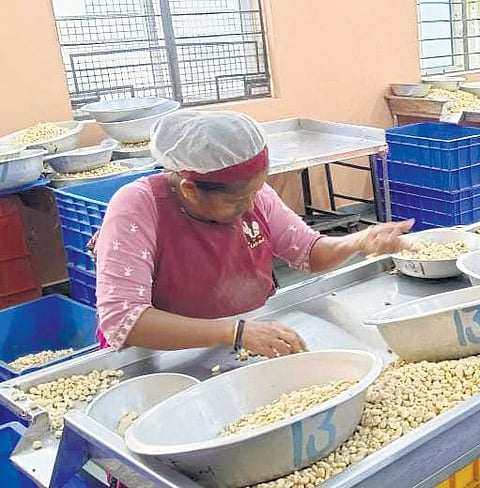

MANGALURU: The impending crisis following attacks on ships on the Red Sea by Houthi rebels, who control large parts of Yemen, in solidarity with Gaza, has affected the cashew industry. There are around 250 cashew industries in Dakshina Kannada, and the district exports around 5,800 tonnes of cashew kernels per annum. It produces 2,45,000 tonnes per annum of cashewnuts.
Kalbavi Prakash Rao, Karnataka Cashew Manufacturers’ Association (KCMA) past president, managing director of Mangaluru-based Kalbavi Consumer Foods Pvt Ltd, and one of the importers of break-bulk raw cashew, said they are engaged in import-export business to Africa, Europe and US via sea, using the Red Sea channel and Suez canal. However, he said that due to the Red Sea crisis, vessels are now forced to take longer routes via Cape of Good Hope at the southern tip of Africa, and travel all the way to Europe over an additional 6,300 nautical miles and 15 extra days of ocean travel.
“Cashew exporters from Dakshina Kannada are affected as there is a steep hike in ocean freight by over $2000 per container, and more than 19,000 vessels are stuck in the safe waters of the Red Sea, due to which there might be a huge delay in cargo reaching its destination. It has already resulted in shortage of containers and port congestion due to the sudden arrival of ships,” he said.
Imports are not much impacted as most of them are from East and West Africa, below the Red Sea. What is most worrying for the cashew industry is that during Covid, there was a major disruption in shipping logistics. It took almost one-and-half years to return to normal. There was a shortage of containers, and the cost of freight had gone up.
“The Houthis’ war has resulted in vessels being unable to keep schedules and taking 15 to 20 days to reach ports, hence we foresee disruption in logistics services again. Though there is no direct impact right now, gradually, prices will increase and there will be a shortage of containers. This issue is on international waters and the US is intervening. Unless this war ends, we are not seeing an end to this problem. It is impacting our exports but over time, with overall increase in freight tariff, it will also impact our imports. Oil prices are going
up due to which freight charges will also go up,” added Kalbavi.
Break-bulk cargo the answer?
Cashew manufacturers are contemplating using break-bulk vessels where three to four exporters join up and bring break-bulk cargo.
“We hired a ship and brought a break-bulk cargo container from Tanzania a few days ago. However, there is a lot of risk involved in such operations as we don’t use regular shipping lines. We are taking the risk to keep factories open and supplies in,” said Kalbavi.